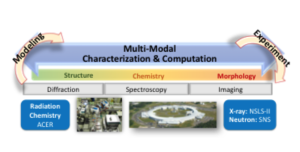Molten Salt Reactors (MSRs) are leading candidates for next-generation nuclear reactors to contribute to the U.S. energy supply. MSRs are a potentially game-changing technology that could create a cost-competitive, safe, and more sustainable commercial nuclear power option, including the possibility of a once-through uranium fuel cycle. The first prototype MSR was demonstrated at Oak Ridge National Lab over 45 years ago – but there has been a resurgence of interest among commercial developers and government agencies worldwide over the past decade as advantages are recognized and new design concepts have matured.
MSR designs include molten salts as coolants for solid-fueled reactors operating at >500 °C, and liquid-salt-fueled reactors containing the nuclear fuel constituents dissolved in a homogeneous molten salt as both fuel matrix and primary coolant operating at 500-900 °C. The liquid-salt fueled reactors offer the benefit of not requiring solid fuel fabrication but impose the need to manage dissolved actinide fuels, typically at several mol%, and fission products.
We are part of the Molten Salts in Extreme Environments EFRC, supported by the Department of Energy. MSEE is led by Brookhaven National Laboratory, and we working with a computational team from Oak Ridge National Laboratory and the University of Iowa. We are using classical and quantum simulations to understand and predict the thermodynamic, structural and dynamic properties of molten salts. This work will provide a fundamental scientific basis upon which MSR technology can be developed. Currently, we are evaluating the accuracy of various force fields for simulating pure molten salts and their mixtures. Longer term, we will examine how fission products and fuel dissolved in the salts affects properties. All of the computational work is tightly integrated with experimental efforts carried out by other MSEE team members.
Click here to see a video on this project

Cole Strickling and Yong Zhang are working on this project. This work is supported by the Department of Energy.
